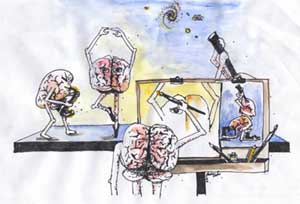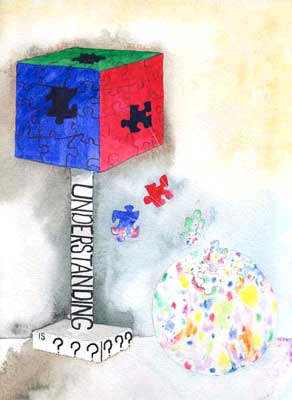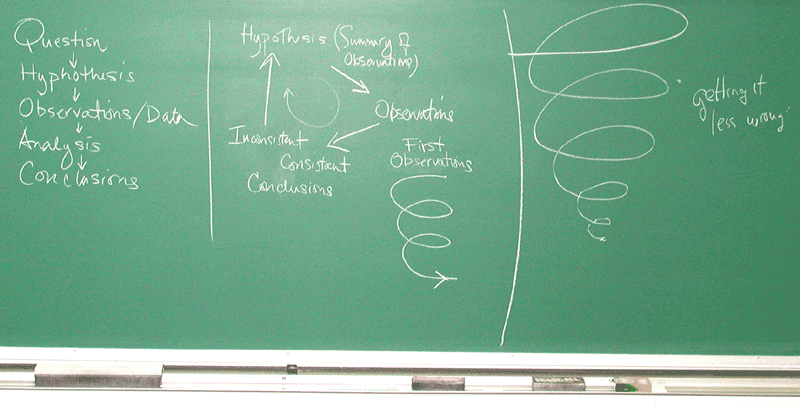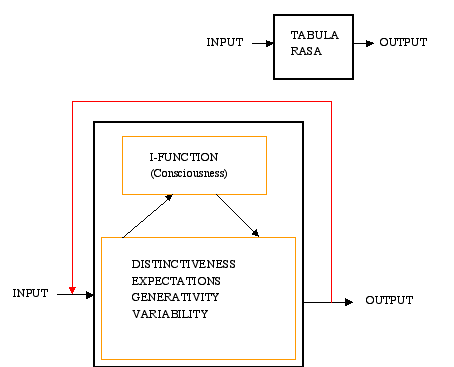Introductory Science:
Experiments in Bridging Cultures
Paul Grobstein, Spring 2002
The Historical Context, Importance, and Challenge
I believe the intellectual life of the whole of western society is increasingly being split into two groups. When I say the intellectual life, I mean to include also a large part of our practical life, because I should be the last person to suggest the two can at the deepest level be distinguished ... Literary intellectuals at one pole - at the other scientists ... Between the two a gulf of mutual incomprehension - sometimes (particularly among the young) hostitility and dislike, but most of all lack of understanding ... This polarisation is sheer loss to us all. To us as people, and to our society. It is at the same time practical and intellectual and creative loss, and I repeat that it is false to imagine that those three considerations are clearly separable. C.P. Snow, The Two Cultures, 1959
 If the natural sciences can be successfully united with the social sciences and the humanities, the liberal arts in higher education will be revitalized ... The future of the liberal arts lies ... in addressing the fundamental questions of human existence head on, without embarrassment or fear, taking them from the top down in easily understandable language, and progressively rearranging them into domains of inquiry that unite the best of science and the humanities at each level of organization in turn.
If the natural sciences can be successfully united with the social sciences and the humanities, the liberal arts in higher education will be revitalized ... The future of the liberal arts lies ... in addressing the fundamental questions of human existence head on, without embarrassment or fear, taking them from the top down in easily understandable language, and progressively rearranging them into domains of inquiry that unite the best of science and the humanities at each level of organization in turn. E.O. Wilson, Consilience, 1998
Current Realities, Significance, and Potential
My personal view of science for many years was, well, summed up with one word, "Yuck!"; in primary school it was undistinguishable from the morass of general information we learned from uninspiring textbooks and well-meaning, but insipid teachers. Middle school was worse: sterile classrooms in which science was lectured at us, and labs were limited to teacher demonstrations with very little student-centered learning ... Along with college pretty much came the exit of science from my life.
High School Teacher, 2000
We want to give our students the tools they need to be political actors in the world. Failing to teach them that, we are failing the traditional political mission of women's studies programs ... Contextualizing science is also essential for our science majors, failing to address ethical issues raised by the practice of science is to fail as science educators. Social questions are not just "hooks" to "real science", but rather deeply inform the way science is done".
A Conversation About Gender and Science, 2002
 At the beginning of the term, I resisted the "cube of applied logic," secretly favoring the multi-colored "sphere of intuitive knowledge." ... The bold colors of logic and critical thinking suggested limitation, and a lack of mental "freedom." Reasoning represented an often cumbersome, painful process requiring patience and discipline. However ... Gradually I found that the exploration of various models of thinking could be interesting and even exciting. I discovered that intuitive thinkers like myself need not fear theoretical models of applied logic. Theoretical models are simply different glasses through which to observe and interpret the world. While I have been busy learning to "think" in new ways, it seems that I have been revising my attitude towards thinking, as well. I have learned that exploring new models or frameworks encourages a certain fluidity of thinking and keeps the mind reaching for new understandings.
At the beginning of the term, I resisted the "cube of applied logic," secretly favoring the multi-colored "sphere of intuitive knowledge." ... The bold colors of logic and critical thinking suggested limitation, and a lack of mental "freedom." Reasoning represented an often cumbersome, painful process requiring patience and discipline. However ... Gradually I found that the exploration of various models of thinking could be interesting and even exciting. I discovered that intuitive thinkers like myself need not fear theoretical models of applied logic. Theoretical models are simply different glasses through which to observe and interpret the world. While I have been busy learning to "think" in new ways, it seems that I have been revising my attitude towards thinking, as well. I have learned that exploring new models or frameworks encourages a certain fluidity of thinking and keeps the mind reaching for new understandings.
Freshman Bryn Mawr student, 2001
The last thing in my life which inspired me was love. So perhaps by learning about it I could somehow rekindle that inspiration ... The first thing that emerged was my training as a chemist ... I was going to define system at question and then study it. My advisor ... called this "intellectual schizophrenia". I definitely had two sides to my inquiries. One had to do with what I thought was proper science, the inquiry concerned with the "right" answer. That is, anything a scientist sayts should be possible to rephrase as a summary of well-defined observations. The other part of me was concerned with concepts that mattered to me. These were abstract concepts such as love and philosophy. What I had to do for the first time in my life is to try to put the two together.
Senior Bryn Mawr chemistry student, 2001
Ten Plus Years of Trying to Get it Less Wrong: The Beginning

| "--- you don't reach Serendib by plotting a course for it. You have to set out in good faith for elsewhere and lose your bearings ... serendipitously." (John Barth, The
Last Voyage of Somebody the Sailor)
|
I'm going to spend less
time worrying about whether other people think I'm doing my job right, and more time thinking. And I'm going to tell my students that that's what they should be
doing too, whether or not they or anybody else think that's what I'm supposed to be telling them. And I'm going to tell my kids to stop trying to get everything right on
their worksheets, and instead every once in a while to try something different, to do something differently, just for the hell of it and to see what happens.
Paul Grobstein, 1991
Biology 101 is not a "typical" science course, one in which the primary concern is to
efficiently summarize a particular body of facts that students are expected to learn. It
is, instead, a course predicated on and structured in terms of the fundamental activities
of science itself, a process in which facts (observations) motivate ideas which in turn
motivate observations which in turn motivate ideas in a continuing recurring
interaction. One immediate consequence of this is that Biology 101 may place on you
somewhat more responsibility for your own education than you have become used to
from previous science courses. You will be given no list of particular things you are
"supposed to know." You will instead be invited to listen to, read about, work through
in your own mind, and contribute to an ongoing discussion of the relation between
observations and ideas in biology. It is our belief that the experience of you making
biology make sense to yourself is the most valuable thing you can take from this
course, and also the most effective way to define and learn what one is "supposed to
know."
Biology 103 syllabus, 1993
Science and life are both processes not of becoming "right" but rather of becoming "less wrong." Briefly discuss why this is an important distinction,
and illustrate it using whatever concrete "less wrong" understanding about biology you acquired and were most impressed by during this semester.
Biology 101 final examination question, 1993
Ten Plus Years of Trying to Get it Less Wrong: Experiments Along the Way
|
| Teach science as the open-ended, enjoyable process it is (should be)
|
Teach science in terms of the exploratory inclinations
which are inherent in all brains
|
And ...
- Stop thinking about what others want; its your privilege/obligation to define the field
- If time is a constraint, give up content before process
- Enjoy/learn from teaching
- If you're not enjoying/learning, its what you're doing, not the students who need to change
- Keep working at getting it less wrong
- Share with/learn from others
 At the beginning of the term, I resisted the "cube of applied logic," secretly favoring the multi-colored "sphere of intuitive knowledge." ... The bold colors of logic and critical thinking suggested limitation, and a lack of mental "freedom." Reasoning represented an often cumbersome, painful process requiring patience and discipline. However ... Gradually I found that the exploration of various models of thinking could be interesting and even exciting. I discovered that intuitive thinkers like myself need not fear theoretical models of applied logic. Theoretical models are simply different glasses through which to observe and interpret the world. While I have been busy learning to "think" in new ways, it seems that I have been revising my attitude towards thinking, as well. I have learned that exploring new models or frameworks encourages a certain fluidity of thinking and keeps the mind reaching for new understandings.
At the beginning of the term, I resisted the "cube of applied logic," secretly favoring the multi-colored "sphere of intuitive knowledge." ... The bold colors of logic and critical thinking suggested limitation, and a lack of mental "freedom." Reasoning represented an often cumbersome, painful process requiring patience and discipline. However ... Gradually I found that the exploration of various models of thinking could be interesting and even exciting. I discovered that intuitive thinkers like myself need not fear theoretical models of applied logic. Theoretical models are simply different glasses through which to observe and interpret the world. While I have been busy learning to "think" in new ways, it seems that I have been revising my attitude towards thinking, as well. I have learned that exploring new models or frameworks encourages a certain fluidity of thinking and keeps the mind reaching for new understandings. If the natural sciences can be successfully united with the social sciences and the humanities, the liberal arts in higher education will be revitalized ... The future of the liberal arts lies ... in addressing the fundamental questions of human existence head on, without embarrassment or fear, taking them from the top down in easily understandable language, and progressively rearranging them into domains of inquiry that unite the best of science and the humanities at each level of organization in turn.
If the natural sciences can be successfully united with the social sciences and the humanities, the liberal arts in higher education will be revitalized ... The future of the liberal arts lies ... in addressing the fundamental questions of human existence head on, without embarrassment or fear, taking them from the top down in easily understandable language, and progressively rearranging them into domains of inquiry that unite the best of science and the humanities at each level of organization in turn. 

